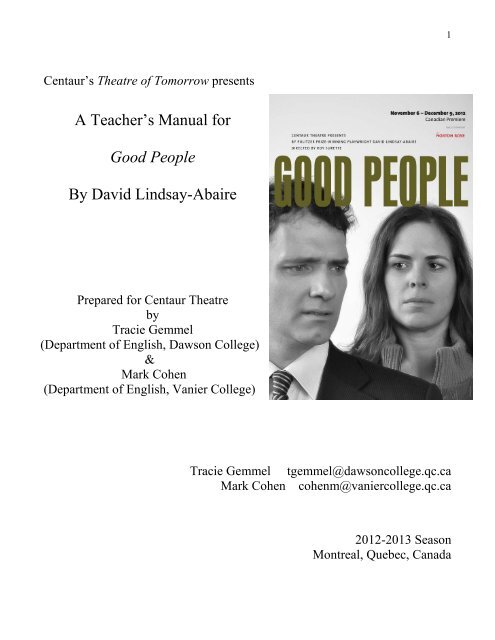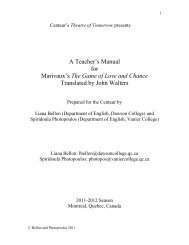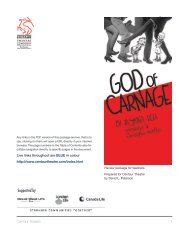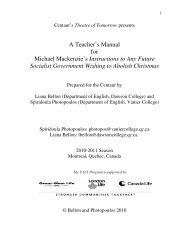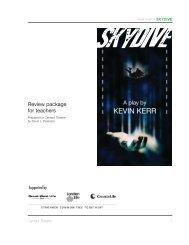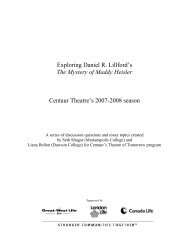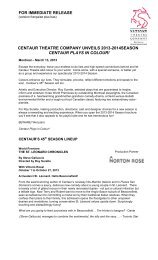A Teacher's Manual for Good People By David ... - Centaur Theatre
A Teacher's Manual for Good People By David ... - Centaur Theatre
A Teacher's Manual for Good People By David ... - Centaur Theatre
Create successful ePaper yourself
Turn your PDF publications into a flip-book with our unique Google optimized e-Paper software.
1<br />
<strong>Centaur</strong>’s <strong>Theatre</strong> of Tomorrow presents<br />
A Teacher’s <strong>Manual</strong> <strong>for</strong><br />
<strong>Good</strong> <strong>People</strong><br />
<strong>By</strong> <strong>David</strong> Lindsay-Abaire<br />
Prepared <strong>for</strong> <strong>Centaur</strong> <strong>Theatre</strong><br />
by<br />
Tracie Gemmel<br />
(Department of English, Dawson College)<br />
&<br />
Mark Cohen<br />
(Department of English, Vanier College)<br />
Tracie Gemmel tgemmel@dawsoncollege.qc.ca<br />
Mark Cohen cohenm@vaniercollege.qc.ca<br />
2012-2013 Season<br />
Montreal, Quebec, Canada
At Great-West Life, London Life and Canada Life, we are committed to enriching communities through<br />
our support of the arts. We focus on accessibility and audience involvement, and encourage the<br />
participation and education of youth. We’re proud to support <strong>Theatre</strong> of Tomorrow through the <strong>Centaur</strong><br />
<strong>Theatre</strong> Company as they engage minds, entertain audiences and encourage new ideas.<br />
2
3<br />
DAVID LINDSAY-ABAIRE<br />
American playwright and lyricist <strong>David</strong> Lindsay-Abaire was born on November 30, 1969. to a working<br />
class family of five in a rough South Boston neighbourhood. His father sold fruit out of a truck in<br />
Boston’s Chelsea Fruit Market and his mother worked on a circuit-board assembly line. The young<br />
<strong>David</strong> attended Boston public schools until the seventh grade, when he received a six-year scholarship to<br />
the Milton Academy, a small, private New England boarding school. Known to his classmates as the<br />
“funny one,” he wrote what he called "terrible, terrible plays" as a result of the school's tradition of<br />
presenting original student work. He went on to study acting and writing at Sarah Lawrence College<br />
where he met actor Chrisinte Lindsay. They married on April 9, 1994. From 1996-1998 he attended the<br />
prestigious Lila Acheson Wallace American Playwrights Program at the Juilliard School on fellowship,<br />
where he studied with playwrights Marsha Norman and Christopher Durang and began writing his first<br />
off-Broadway hit, Fuddy Meers.<br />
Other successful plays quickly followed. Wonder of the World (2000); Kimberly Akimbo (2001), which<br />
received the L.A. Drama Circle Award <strong>for</strong> Playwriting, three Garland Awards, and the Kesselring Prize;<br />
and the Rabbit Hole (2006). For the latter Pulitzer prize-winning drama about the loss of a child he also<br />
wrote the screenplay <strong>for</strong> the 2010 film of the Rabbit Hole starring Nicole Kidman. In film, his writing<br />
credits include the movie Robots (2006) and the screenplay <strong>for</strong> Inkheart (2007). He also wrote the book<br />
<strong>for</strong> the musical High Fidelity, and the book and lyrics <strong>for</strong> Shrek the Musical.<br />
His play <strong>Good</strong> <strong>People</strong> had its official opening on Broadway on March 3, 2011, with Frances<br />
McDormand and Tate Donovan in the lead roles. Presently, Lindsay-Abaire lives in Brooklyn with his<br />
wife Christine and their son Nicholas who was born in 2000.<br />
CAST OF CHARACTERS<br />
Margaret: Caucasian, about fifty<br />
Stevie: Caucasian, late twenties<br />
Dottie: Caucasian, mid-sixties<br />
Jean: Caucasian, about fifty<br />
Mike: Caucasian, about fifty<br />
Kate: African American, early thirties<br />
Various offstage voices: probably pre-recorded<br />
.
4<br />
SYNOPSIS<br />
This is what fools people: a man is always a teller of tales, he lives surrounded by his stories and the<br />
stories of others, he sees everything that happens to him through them; and he tries to live his life as if<br />
he were telling a story<br />
-Jean-Paul Sartre<br />
<strong>Good</strong> <strong>People</strong> is set in South Boston’s Lower End and in Chestnut Hill, an affluent Boston suburb. The<br />
main character is Margaret, a 50-year-old woman who grew up in the rough and tumble south end of<br />
Boston. Lindsay-Abaire describes his own mother as having “a mouth like a trucker,“hilarious” and “the<br />
per<strong>for</strong>mer” of his family. In many ways this describes Margaret or “Margie,” (pronounced with a hard<br />
“g” as the script indicates). Margie navigates her life of living below the poverty line with humour, and<br />
colourful slice-of-life stories filled with poor and disenfranchised “Southies”. In the first scene of the<br />
play, when her boss at the Dollar Store, Stevie, attempts to tell Margaret that she is fired, she tries to<br />
avoid the grim prospect of losing her job as cashier by recounting a humorous anecdote about Stevie’s<br />
mother. The truth of her story is questionable, it fails to redeem her, and she is fired <strong>for</strong> her inability to<br />
get to work on time. Stevie, a young Southie man in his late twenties has to fire Margaret or risk losing<br />
his job, but he is ultimately sympathetic to Margaret, and suggests that she try to find work at Gillette,<br />
one of the community’s main employers.<br />
Mulling over the depressing prospects of finding another job, Margaret’s friend Jean suggests that she<br />
approach Mikey Dillon (Mike) <strong>for</strong> a job. Mike, is an old flame of Margaret’s and a <strong>for</strong>mer Southie who<br />
has escaped the poverty of South Boston’s lower end by becoming a doctor. When Margaret approaches<br />
Mike <strong>for</strong> a job, their encounter becomes the heart of the play, and explores questions of class, social<br />
versus individual responsibility, community, race, and gender in relation to issues of social mobility. In<br />
Act II, Margaret shows up at Mike’s door in Chestnut Hill, and her Southie ways clash with Mike’s<br />
educated adult persona and sensibility. Mike’s wife Kate, fascinated and curious about her husband’s<br />
Southie roots, allows herself to be pulled into the drama and conflict of Margaret and Mike’s “reunion.”<br />
Things turn sour when Margaret’s stories of their colourful past, which Lindsay-Abaire makes<br />
intentionally ambiguous, raise questions about the “truth” of the past and present reality in all of their<br />
lives. Following the dramatic and potentially damaging evening Margaret spends with Mike and Kate,<br />
the play ends on a somewhat positive note. Margaret’s future is brighter with the prospect of a job at<br />
Gillette and the generosity of Stevie, who has encountered a bit of luck.<br />
TOPICS and THEMES<br />
1. Class relations in America<br />
2. The American dream: fact or fiction<br />
3. Being successful in America: hard work or luck<br />
4. Social responsibility<br />
5. Is being philanthropic a luxury?<br />
6. What is community in America?<br />
7. What is political correctness?
5<br />
8. Class/racial stereotypes<br />
9. The stories we live by<br />
10. Storytelling as a coping mechanism<br />
11. Truth and memory<br />
12. The intersection of personal and national mythologies<br />
STUDY QUESTIONS<br />
1. Scene one of the play takes place in an alley with a dumpster and a rusty chair behind a dollar store.<br />
Why does the playwright choose this setting? What symbolic associations do we make with a dollar<br />
store and the overall setting in this scene?<br />
2. Why does Margaret tell Stevie the story about his mother? What is she trying to do, and why does her<br />
story fail to change Stevie’s mind about firing Margaret? Do you believe Margaret’s version of the<br />
story?<br />
3. Throughout the play, is Margaret’s sense of a Southie community real or imagined? Do people in her<br />
community look out <strong>for</strong> one another, or is everyone simply motivated by self-interest?<br />
4. Draw a character sketch of Margaret. Is she a stereotype of an uneducated, lower class middle-aged<br />
woman, or is she something more than this? Give examples of things she says and does to suggest either.<br />
Do you view Margaret as being “too nice,” as Jean describes her, or has she become “mean” like the<br />
other Southie girls, as Mike suggests?<br />
5. What do the expressions “good people,” and “lace-curtain” mean in the play? Is it fair <strong>for</strong> Margaret to<br />
say that Mike has become “all lace-curtain”?<br />
6. When Margaret approaches Mike <strong>for</strong> a job, does this illustrate naivety or resourcefulness? Does Mike<br />
want to help Margaret out?<br />
7. Where throughout the play does Margaret appear politically incorrect? Where conversely does she<br />
appear to be witty and insightful? Note Margaret’s off-colour remarks and contrast them with examples<br />
of the political correctness that Kate and Mike display.<br />
8. Throughout the play, Margaret shows distrust, perhaps even a paranoia of the intentions of others.<br />
Who and what is she distrustful of exactly? How can we explain this distrust, and do you think she is<br />
justified? Why might a woman like Margaret feel easily threatened and mistrustful of people?<br />
9. In scene three, Margaret pushes certain emotional buttons that upset and anger Mike. What are these<br />
emotional buttons? What is she doing, and why?<br />
10. When Kate confuses Margaret with one of the caterers, why does she feel bad, and why can she<br />
relate to what Margaret might be feeling? Is Margaret offended by Kate? Why might being mistaken <strong>for</strong><br />
a caterer ironically not bother Margaret?
6<br />
11. What explains Kate’s welcoming and warm behaviour towards Margaret? Is her interest in Margaret<br />
sincere? Why is Mike not thrilled to have Margaret in their home? Is it because of their past together or<br />
is it a question of class?<br />
12. Why doesn’t Mike tell Kate that he and Margaret were more than friends?<br />
13. Why does Margaret accuse Mike of being Joyce’s father? Does she do it because her friend Jean<br />
suggested it, or does she do it <strong>for</strong> another reason?<br />
14. Do you believe that Mike is Joyce’s father? Based on a careful examination of the text, who do you<br />
think is telling the truth? How can we tell when Margaret is telling the truth? Why does Lindsay-Abaire<br />
make it so ambiguous?<br />
15. Throughout most of Act Two, Kate seems very sympathetic towards Margaret. What do you make of<br />
her reaction to the idea that Mike may be Joyce’s father? What is her initial attitude and how does it<br />
evolve as she comes to fear that Margaret may really be telling the truth? How does she call Margaret’s<br />
bluff?<br />
16. Do you think that Margaret is a bad person and mother as Kate suggests she is if her story about<br />
Mike being Joyce’s father is true? Kate judges her <strong>for</strong> not putting her pride aside and approaching Mike<br />
<strong>for</strong> help, but is Kate justified in this?<br />
17. Is Mike proud of his Southie roots or embarrassed? Has he lost his “street cred,” or did he ever really<br />
have it? How has he portrayed his past to Kate? Is this a story he tells himself and others? Is it true, or is<br />
it part of his personal mythology? Does Margaret believe that Mike is admirable <strong>for</strong> how he escaped<br />
Southie life?<br />
18. From looking closely at the play, what accounts <strong>for</strong> Margaret’s inability to escape the poverty of<br />
Southie? What sets her apart from Mike? Did Mike have more advantages than she did growing up? If<br />
so, what were they?<br />
19. <strong>By</strong> the end of the play, who do you think is “good people”? After what Margaret does at Mike’s<br />
place, do we think she is “nice”? How do we feel about Mike and Kate? Do they sincerely care about<br />
Margaret and her present situation?<br />
20. In the final scene of the play we assume that the cheque that Dottie receives in the mail to cover<br />
Margaret’s rent is from Mike or Kate. When we discover that it was indeed Stevie’s generosity, due to<br />
his recent luck at bingo, what final message does it seem Lindsay-Abaire wants to give? What does<br />
Stevie’s action say about the Southie community and about community in general?
7<br />
DISCUSSION QUESTIONS<br />
1. The Southie characters like to play bingo, a game that basically relies on luck, rather than on skill or<br />
strategy. How are the two bingo scenes in the play used by the playwright symbolically? What do we<br />
make of the bingo caller being the local priest? Is this meant to be just an amusing detail, or is Lindsay-<br />
Abaire suggesting something more? Margaret is unlucky at bingo, and in her life. What does this<br />
suggest? Are the Southie characters unable to improve their lives because they are relying on a lucky<br />
break and are averse to hard work? In the game of life, is success based on hard work and ambition á la<br />
the American Dream, or on luck and being of the right class, gender and race at birth?<br />
2. According to Michael S. Kimmel and Abby L. Ferber in their preface to Privilege: A Reader:<br />
We live in a nation where – despite all ideological assertions about meritocracy, about<br />
how individuals are free to rise as high as they can based solely on their individual<br />
achievements – race, class, and gender are the best predictors of what we social scientists<br />
call “life chances” – your level of wealth, your occupation, health, even marital<br />
happiness. Ours is a nation where characteristics of your birth are the best predictors of<br />
where you will end up at your death. On the other hand, we actually do want to live in a<br />
nation in which those ideals of individual achievement are actually realized, where talent,<br />
motivation, ambition, and hard work actually do pay off, where race, class, sexuality, and<br />
gender predict very little about your economic and social life.<br />
In <strong>Good</strong> <strong>People</strong>, is Lindsay-Abaire’s America a place where race, class, and gender predict the future of<br />
economic and social life? Even though Mike is born in a lower class Southie neighbourhood, what<br />
advantages does he have that Margaret doesn’t?<br />
3. According to <strong>David</strong> Sheppard, “The story of our lives is our myth. <strong>People</strong> in the later stages of life<br />
seem to become more mythical, to enjoy looking back and spinning yarns about what they experienced.<br />
One thing to keep in mind is that myths don’t necessarily pertain to the literal part of our lives but how<br />
we experience events internally, our perceptions and emotional reactions.”<br />
Throughout the play Margaret tells stories about the past, and Lindsay-Abaire intentionally makes us<br />
question the truth of her stories. Margaret seems to have a personal mythology that sustains her belief<br />
that she is a “good” person, and “nice.” When Margaret tells her stories, however, the truth is always<br />
questionable. Mike also has a personal mythology that accounts <strong>for</strong> his ability to escape Southie. When<br />
both of these characters reveal their personal mythologies, naturally other characters puncture the<br />
validity of their stories and memories of their pasts. Take a close look at all of the “stories” in the play.<br />
It is not just Margaret who is questioned <strong>for</strong> telling the truth. Kate also seems to question Mike’s<br />
portrayal of the truth in his past and present life. What parallel might Lindsay-Abaire be making<br />
between personal mythmaking and the American Dream, which is part of American mythology?
8<br />
RESEARCH QUESTIONS<br />
1. American life and culture, is extremely influenced by what is commonly known as the “American<br />
Dream.” James Truslow Adams coined the phrase "American Dream" during the depths of the Great<br />
Depression. In his book, The Epic of America, which was published in 1931, Adams describes America:<br />
[It] is a land in which life should be better and richer and fuller <strong>for</strong> everyone, with opportunity<br />
<strong>for</strong> each according to ability or achievement … It is not a dream of motor cars and high wages<br />
merely, but a dream of social order in which each man and each woman shall be able to attain to<br />
the fullest stature of which they are innately capable, and be recognised by others <strong>for</strong> what they<br />
are, regardless of the <strong>for</strong>tuitous circumstances of birth or position.<br />
Adams was careful to say the American Dream was not just a desire <strong>for</strong> affluence, but historian <strong>David</strong><br />
Farber says the term quickly came to include it. The American Dream "became closely linked to<br />
material com<strong>for</strong>t, to the consumer abundance America was producing. 'A better life' started to connote<br />
not just an economically secure life, but an abundant life. So there's a kind of linkage between mobility,<br />
a better life, and the good stuff that would make it so."<br />
What do you think the American Dream means to people today? Has the meaning changed? Do we<br />
ascribe to the American Dream in Canada?<br />
2. Read “Class in America” by Gregory Mantsios (see link below). What are the myths, and realities of<br />
class in America today?<br />
http://povertyisviolence.blogspot.ca/2009/03/class-in-america-gregory-mantsios.htm<br />
3. Is South Boston today still the rough and tumble area that it was in past, or has it been gentrified?<br />
What does gentrification mean? Does Lindsay- Abaire present us with a gentrified South Boston in his<br />
play? Research what made Southie the infamous place that it is today. Name some well-known movies<br />
and T.V. shows like Southie Rules, that have been set in South Boston. What are the Southie characters<br />
like in the play?<br />
4. When Margaret loses her job at the beginning of the play, she does not have unemployment insurance<br />
to fall back on. Margaret also struggles to look after Joyce because she is disabled and requires special<br />
care. How is life sometimes tougher in the U.S. than in Canada? Does the U.S. have social programs like<br />
Canada? Define what a welfare state is. What is the purpose of a welfare state?<br />
CLASSROOM ACTIVITIES<br />
1. In small groups, students make a list of all of the material objects, lifestyle choices, and world-views<br />
that Lindsay-Abaire uses throughout the play to help him in painting a portrait of lower and upper<br />
middle-class America. Students will discuss whether or not his portrait is realistic or stereotyped. What<br />
separates the Southies from the Chestnut Hill set? Why is it so hard <strong>for</strong> classes to mix socially?<br />
2. In small groups, students imagine that they are directing the play and want to set it in Montreal rather<br />
than in South Boston’s Lower End and in Chestnut Hill. If this play were set in Montreal what
9<br />
neighbourhoods might be chosen? Students need to write a brief description of the neighbourhoods and<br />
what the people who live there are like.<br />
3. In Act Two, we learn that Mike and Kate are seeing a marriage therapist. Although we are given some<br />
hints, it is not clear what the couple’s issues are exactly. From what the playwright gives us (examine<br />
the subtext and dialogue), imagine what their issues are. Form a group with other students and have<br />
Mike and Kate appear on Oprah or the Dr. Phil show. You will have to identify the issues they have to<br />
work out and the host’s strategy <strong>for</strong> getting them to resolve these issues be<strong>for</strong>e you present your skit to<br />
the class.<br />
4. Margaret loses her job, and must apply <strong>for</strong> new ones. With a partner, write a cover letter that we<br />
imagine she might write. What would she say? What would the tone and overall style of her writing look<br />
and sound like? Students should imagine a fictional job, or find an actual job posting online or from a<br />
newspaper.


